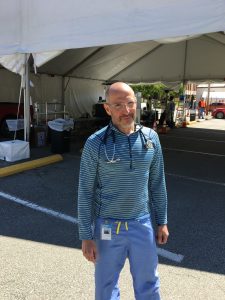The first investigational agent to be evaluated by ACTIV-2 is LY3819253, an experimental monoclonal antibody treatment made by Lilly Research Laboratories in partnership with AbCellera Biologics.

UNC Institute for Global Health and Infectious Diseases researchers have begun phase 2 and phase 3 evaluations of promising treatments for COVID-19. The UNC School of Medicine joins more than 25 initial sites participating in the clinical trials through ACTIV-2, a public-private partnership sponsored by the NIH’s National Institute of Allergy and Infectious Diseases to coordinate COVID-19 research and speed development of the most promising treatments and vaccines. This two-phase trial is being conducted by the AIDS Clinical Trials Group to evaluate the safety and efficacy of treatments for adults who have COVID-19 but do not require hospitalization.
The study also aims to assess the correlation between changes in viral shedding and clinical outcomes, leading to a better understanding of whether medications can reduce or halt the transmission of SARS-CoV-2, the virus that causes COVID-19. Throughout the randomized, blinded, controlled study, investigators will add and remove promising treatments to efficiently test them against placebos. No vaccine or therapeutic is currently approved for outpatient treatment or prevention of COVID-19.
With different agents being introduced over time, the study will be ongoing over an indefinite period of time, said David Wohl, MD, principal investigator for the study at the UNC School of Medicine and a vice chair of the ACTG study team. “We hope to develop a treatment that can prevent people with COVID-19 from developing advanced disease that requires hospitalization. People who have COVID-19 may start off with just a few minor symptoms, but they can rapidly become very ill — whether they are young or old.”
To learn more and enroll in the study, visit www.ACTIV-2.org or call (877) 345-8813
To qualify for the study, participants must have tested positive for the SARS-CoV-2 virus in an outpatient setting within seven days and started experiencing symptoms within 10 days of enrolling in the study. At least half of the participants will have factors that put them at high risk of progressing to severe COVID-19, including being age 55 or older and having one of the following conditions: chronic lung, kidney, or liver disease; obesity; hypertension; cardiovascular disease; diabetes; or moderate to severe asthma. ACTG is committed to enrolling individuals most impacted by COVID-19 and will work closely with community partners to make participation in the trial available to those who are often underrepresented in clinical research.
“People living in the Triangle area who have recently been diagnosed with COVID-19 and are not hospitalized have the opportunity to make a huge contribution by participating in this study,” says Wohl.
The phase 2 evaluation of treatments involves determining the safety, antiviral activity, and ability of investigational agents to reduce the duration of COVID-19 symptoms over 28 days. These agents will be selected based on the presence of in vitro data demonstrating activity against SARS-CoV-2 and phase 1 pharmacokinetics and safety data. Half of the 220 study participants will receive the investigational agent and be compared to the participants receiving a placebo. Any agent that demonstrates positive results and meets study-defined criteria will advance to phase 3, in which 1,000 participants will receive the agent and be compared to 1,000 participants receiving a placebo.
Joseph Eron, MD, chief of UNC’s infectious diseases division at UNC School of Medicine, co-chairs ACTG with Judith Currier, MD, at UCLA. Leading the trial protocols are Davey Smith, MD, at the University of California, San Diego, who is cochair along with Wohl and Kara Chew MD, and Eric S. Daar, MD, both of UCLA.
“We strongly believe that evaluating antiviral therapy early in the treatment of COVID-19 is essential and effective therapy that will prevent worsening illness and hospitalization and may have the added benefit of reducing the risk of SARS-CoV-2 transmission,” says Eron. “ACTIV-2 is changing our approach to fighting this infection and is a major contribution to the response of science to ending the COVID-19 pandemic.”
The first investigational agent to be evaluated by ACTIV-2 is LY3819253, an experimental monoclonal antibody treatment made by Lilly Research Laboratories in partnership with AbCellera Biologics. AbCellera and the Vaccine Research Center at NIAID identified the antibody from a blood sample of one of the first people in the United States to recover from COVID-19.
Learn more about monoclonal antibodies here and here.
ACTIV-2 also receives support from Operation Warp Speed, the U.S. government’s multi-agency effort to accelerate the development, manufacturing, and distribution of COVID-19 vaccines, therapeutics, and diagnostics.